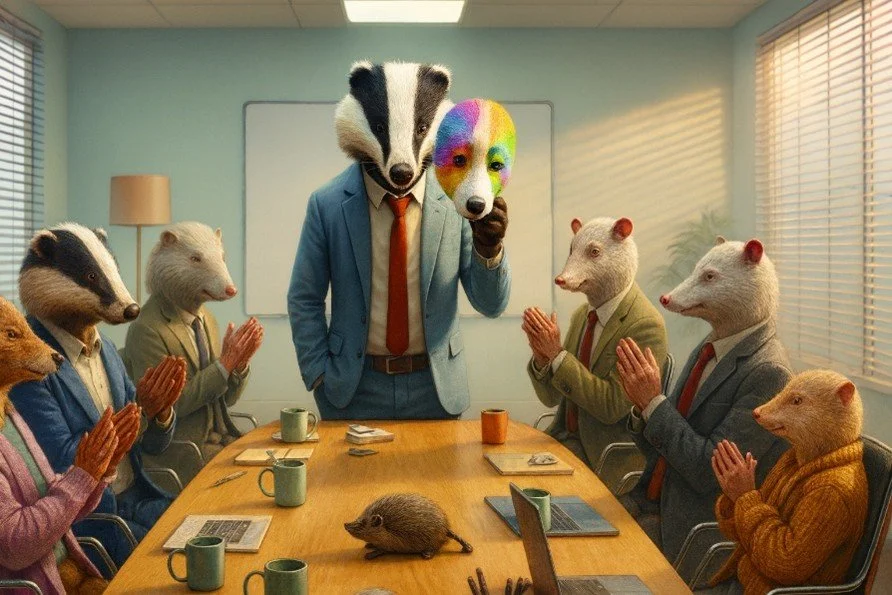6. The Regenerative Leader’s Superpower
Vulnerability as a Force for Collective Healing
You don’t often hear the words leadership and healing in the same sentence.
Usually it’s more about results. Growth. KPIs. Scalability. Agile responsiveness. (Don’t get me started again.) Somewhere in there, we forgot that businesses aren’t just machines. They’re living, breathing systems made of people - real ones, with doubts, dreams, families, fears and caffeine habits.
Which means leadership isn’t just about steering the ship. It’s also about the tone you set. The culture you create. The space you hold and if you’re brave enough, it can be about something even bigger.
Healing. Not in the dramatic, incense-burning sense. But in the everyday, deeply human sense. The kind that starts with a leader who’s willing to be seen.
That time I thought I had to hold it all together
There was a time I genuinely believed that being the leader meant holding everything in. Not just the business decisions, but the emotions too. The stress. The worry. The weight of trying to protect everyone from what I was carrying.
I thought showing it would rattle people. So I hid it.
Kept smiling. Kept charging forward. Kept quietly falling apart on the inside.
Until one day, someone in the team - who I considered to be one of the most grounded, quietly powerful people in the place - sat across from me and said, “It’s OK to let people see you’re human. We’d trust you more if you did.”
That one landed.
Because deep down, I knew they were right.
When the leader heals, the culture follows
Vulnerability isn’t just about being seen. It’s about breaking the cycle of silence.
Because every leader carries a kind of invisible influence. The way you handle mistakes. The way you speak. The way you show up on the bad days. It all sends a signal.
If you create a culture where perfection is the price of admission, people will hide their struggles. If you create a culture where questions are met with jargon and smirks, people will stop asking.
But if you create a culture where it’s safe to tell the truth, to admit uncertainty, to be human - then you start to heal something. Not just in your workplace, but in the people in it.
Because let’s be honest. Most people carry bruises from bad leadership. From working under someone who never listened. Who never said sorry. Who led through fear. Who wore a mask so thick no one ever saw the real person underneath.
You can break that cycle.
Not with a rebrand. Not with a wellness initiative. But by being the kind of leader who makes honesty normal again.
Regeneration starts with you
If you’ve been following this series (or even just skim-reading it while pretending to look busy in a meeting), you’ve seen the pattern.
Real leadership - the kind that transforms - starts with vulnerability.
It builds trust
It invites connection
It normalises failure
It demands authenticity
It makes room for clarity
It unlocks healing
This is regenerative leadership. Not just fixing problems. Not just building strategies. But making things better. Deeper. More human. More whole.
It’s the kind of leadership that doesn’t just get things done, but helps people grow while they do it.
But isn’t this all a bit soft?
No. It’s brave.
There’s nothing soft about standing in a room full of people and admitting when you’re not sure. There’s nothing fluffy about creating a culture where someone feels safe enough to say, “I need help.”
There’s nothing weak about rejecting the performance and leading with your actual self.
It’s not about being liked. It’s about being real and when you do that consistently - when you show up without the mask, when you speak without the jargon, when you lead without pretending - you do something remarkable.
You give other people the permission to do the same.
That’s where the ripple starts.
What’s possible?
Imagine if more businesses were led by people who weren’t afraid to be human.
Imagine if workplaces were places of honesty, not hierarchy. Places where people felt safer after a hard day, not more worn down. Places where leaders didn’t hide their humanity, but used it to light the way.
We’d still get results. Possibly even better ones.
But we’d also grow healthier teams. Smarter, more creative thinking. More resilient people. We’d build organisations that actually left the world a little better off than they found it.
That’s what regeneration looks like and it starts not with a five-year plan, but with a simple decision.
To lead, as you are.
Thank you for staying with this series. If you’ve read this far, you already know - the world doesn’t need more perfect leaders. It needs more honest ones. More curious ones. More human ones.
Starting with you.
Let’s see what grows from here.

